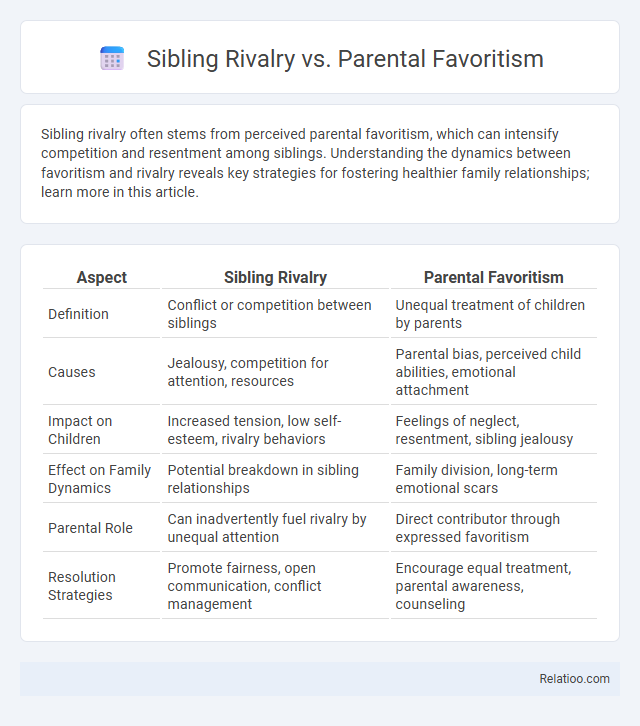Sibling rivalry often stems from perceived parental favoritism, which can intensify competition and resentment among siblings. Understanding the dynamics between favoritism and rivalry reveals key strategies for fostering healthier family relationships; learn more in this article.
Table of Comparison
| Aspect | Sibling Rivalry | Parental Favoritism |
|---|---|---|
| Definition | Conflict or competition between siblings | Unequal treatment of children by parents |
| Causes | Jealousy, competition for attention, resources | Parental bias, perceived child abilities, emotional attachment |
| Impact on Children | Increased tension, low self-esteem, rivalry behaviors | Feelings of neglect, resentment, sibling jealousy |
| Effect on Family Dynamics | Potential breakdown in sibling relationships | Family division, long-term emotional scars |
| Parental Role | Can inadvertently fuel rivalry by unequal attention | Direct contributor through expressed favoritism |
| Resolution Strategies | Promote fairness, open communication, conflict management | Encourage equal treatment, parental awareness, counseling |
Understanding Sibling Rivalry: Roots and Dynamics
Sibling rivalry stems from competition, jealousy, and the need for parental attention, intensified by perceived parental favoritism that deepens emotional divides. Understanding the roots involves recognizing individual temperaments, family dynamics, and communication patterns that fuel conflicts between siblings. Your awareness of these underlying factors can help diffuse tension and promote healthier relationships within the family.
What is Parental Favoritism? Definitions and Examples
Parental favoritism refers to the differential treatment of one child over others by parents, often resulting in emotional and psychological impacts on siblings. Examples include consistently praising one child for academic achievements while neglecting another's efforts or providing more privileges and attention to a particular child, fostering resentment and rivalry. This preferential behavior can exacerbate sibling rivalry by intensifying feelings of jealousy and competition among siblings.
How Favoritism Fuels Sibling Rivalry
Parental favoritism significantly intensifies sibling rivalry by creating feelings of jealousy, resentment, and competition among siblings. When You show preferential treatment toward one child, it undermines fairness and breeds insecurity in others, escalates conflicts and damages family cohesion. Recognizing and addressing favoritism is crucial to fostering healthier sibling relationships and reducing ongoing tensions.
Psychological Effects on Favored vs. Unfavored Siblings
Parental favoritism intensifies sibling rivalry by creating psychological effects such as low self-esteem and increased anxiety in unfavored siblings, while favored siblings may experience pressure to meet heightened expectations, leading to stress and potential resentment. Unfavored siblings often develop feelings of neglect and rejection that can result in long-term emotional difficulties, including depression and difficulties in forming secure relationships. Favored siblings might struggle with identity issues and guilt, which can further exacerbate sibling tensions and impact overall family dynamics.
Signs of Parental Favoritism in Families
Signs of parental favoritism in families include unequal attention, with one child receiving more praise, support, or resources than siblings, leading to feelings of resentment and jealousy. Favoritism often manifests through consistent differential treatment in discipline, emotional support, and decision-making influence. Recognizing patterns such as overt praise, preferential privileges, or dismissive behavior toward other children helps identify favoritism's impact on sibling rivalry and family dynamics.
Strategies to Reduce Sibling Rivalry at Home
Reducing sibling rivalry at home involves fostering open communication, setting clear and consistent boundaries, and ensuring each child feels equally valued to prevent perceptions of parental favoritism. You can implement family meetings to address conflicts collaboratively and practice active listening to validate each child's feelings. Prioritizing quality one-on-one time with each sibling helps build individual self-esteem, easing competitive tensions and promoting harmonious relationships.
Breaking the Cycle: Addressing Parental Bias
Breaking the cycle of sibling rivalry caused by parental favoritism requires acknowledging and addressing underlying biases in family dynamics. You can foster fairness by promoting open communication and ensuring equal attention and support to each child, which helps reduce feelings of resentment and competition. Implementing consistent parenting strategies and encouraging mutual respect among siblings are essential steps toward healthier relationships.
Impact on Long-Term Sibling Relationships
Sibling rivalry often strains long-term sibling relationships by fostering jealousy and competition, while parental favoritism intensifies these issues by creating perceived inequalities and resentment. Favoritism can lead to lasting emotional wounds, decreasing trust and communication between siblings over time. When parental favoritism intersects with sibling rivalry, the compounded effects significantly undermine sibling bonds, often resulting in persistent conflict and weakened family cohesion.
Parental Self-Reflection: Assessing Unconscious Bias
Parental self-reflection plays a crucial role in distinguishing sibling rivalry from parental favoritism by helping parents recognize and assess unconscious biases that may influence their behavior and decisions. Identifying patterns in treatment, emotional responses, and resource allocation allows parents to address favoritism and foster a more balanced family dynamic. Mindful evaluation of parental attitudes promotes fairness, reduces resentment among siblings, and supports healthier sibling relationships.
Building Healthy Family Bonds Despite Differences
Building healthy family bonds despite sibling rivalry and parental favoritism requires consistent communication, empathy, and fair treatment of all children to foster mutual respect and understanding. Parents should acknowledge each child's unique strengths and challenges while avoiding comparisons that fuel competition or jealousy. Encouraging shared activities and open dialogue helps siblings cultivate cooperation and strengthens family unity beyond conflicts.

Infographic: Sibling Rivalry vs Parental Favoritism
 relatioo.com
relatioo.com